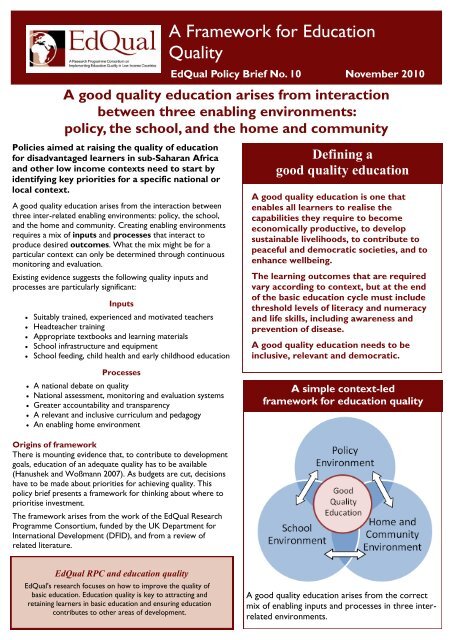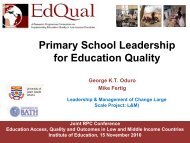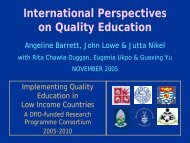What is a Good Quality Education? - EdQual
What is a Good Quality Education? - EdQual
What is a Good Quality Education? - EdQual
- No tags were found...
Create successful ePaper yourself
Turn your PDF publications into a flip-book with our unique Google optimized e-Paper software.
A Framework for <strong>Education</strong><strong>Quality</strong><strong>EdQual</strong> Policy Brief No. 10 November 2010A good quality education ar<strong>is</strong>es from interactionbetween three enabling environments:policy, the school, and the home and communityPolicies aimed at ra<strong>is</strong>ing the quality of educationfor d<strong>is</strong>advantaged learners in sub-Saharan Africaand other low income contexts need to start byidentifying key priorities for a specific national orlocal context.A good quality education ar<strong>is</strong>es from the interaction betweenthree inter-related enabling environments: policy, the school,and the home and community. Creating enabling environmentsrequires a mix of inputs and processes that interact toproduce desired outcomes. <strong>What</strong> the mix might be for aparticular context can only be determined through continuousmonitoring and evaluation.Ex<strong>is</strong>ting evidence suggests the following quality inputs andprocesses are particularly significant:Inputs Suitably trained, experienced and motivated teachers Headteacher training Appropriate textbooks and learning materials School infrastructure and equipment School feeding, child health and early childhood educationProcesses A national debate on quality National assessment, monitoring and evaluation systems Greater accountability and transparency A relevant and inclusive curriculum and pedagogy An enabling home environmentDefining agood quality educationA good quality education <strong>is</strong> one thatenables all learners to real<strong>is</strong>e thecapabilities they require to becomeeconomically productive, to developsustainable livelihoods, to contribute topeaceful and democratic societies, and toenhance wellbeing.The learning outcomes that are requiredvary according to context, but at the endof the basic education cycle must includethreshold levels of literacy and numeracyand life skills, including awareness andprevention of d<strong>is</strong>ease.A good quality education needs to beinclusive, relevant and democratic.A simple context-ledframework for education qualityOrigins of frameworkThere <strong>is</strong> mounting evidence that, to contribute to developmentgoals, education of an adequate quality has to be available(Hanushek and Woßmann 2007). As budgets are cut, dec<strong>is</strong>ionshave to be made about priorities for achieving quality. Th<strong>is</strong>policy brief presents a framework for thinking about where topriorit<strong>is</strong>e investment.The framework ar<strong>is</strong>es from the work of the <strong>EdQual</strong> ResearchProgramme Consortium, funded by the UK Department forInternational Development (DFID), and from a review ofrelated literature.<strong>EdQual</strong> RPC and education quality<strong>EdQual</strong>'s research focuses on how to improve the quality ofbasic education. <strong>Education</strong> quality <strong>is</strong> key to attracting andretaining learners in basic education and ensuring educationcontributes to other areas of development.A good quality education ar<strong>is</strong>es from the correctmix of enabling inputs and processes in three interrelatedenvironments.
<strong>EdQual</strong> Policy Brief No. 10 - November 2010Identifying Policy PrioritiesA framework for education quality<strong>EdQual</strong> and related research, largely gathered in sub-Saharan Africa, suggest some policy priorities towards achieving education quality.Th<strong>is</strong> evidence needs to be interpreted and set against careful analys<strong>is</strong> of local needs and realities. Rather than offering ‘magic bullets’, itprovides starting points for debate and suggestions for ongoing research and evaluation about what works in national contexts.<strong>Quality</strong> InputsSuitably trained and motivated teachersSome countries in Africa face a severe shortage of suitablyqualified and experienced teachers (UNESCO 2008). Initialteacher education and experience has a significant impact onachievement (Michaelowa 2001). Many African countries also facea cr<strong>is</strong><strong>is</strong> in teacher morale related to poor salaries, workingconditions, and limited opportunities for professional development(Bennell and Akyeampong 2007; DFID and VSO 2008). Evidencefrom India suggests that incentives can boost performance. A keychallenge <strong>is</strong> getting qualified and experiencedteachers into rural schools.Headteacher training<strong>EdQual</strong> research underlines the importance ofschool leadership (<strong>EdQual</strong> Policy Briefs 4, 5and 6). Effective headteachers focus on: mobil<strong>is</strong>ing resources and using themefficiently developing and motivating staff maxim<strong>is</strong>ing time on task encouraging parents to support children’slearning promoting inclusion and implementing girl-friendly approachesHowever, headteachers need training in how to monitor schoolquality and initiate school improvement.Appropriate textbooks and learning materialsTextbooksneed to beappropriateto learners’languageabilitiesTextbooks play an important role in ra<strong>is</strong>inglearner achievement (Barrett et al. 2007). A keychallenge <strong>is</strong> the avoidance of corruption andm<strong>is</strong>management of resources (UNESCO 2008).Textbooks and other learning materials need tobe appropriate to the environment and to thecognitive level and language abilities of thelearner and accompanied by teacher training intheir use (<strong>EdQual</strong> Policy Brief 2).Infrastructure and resourcesInvesting in infrastructure and resources can impact on theachievement of d<strong>is</strong>advantaged learners. A key challenge <strong>is</strong> toensure that funding <strong>is</strong> sufficient and <strong>is</strong> efficiently d<strong>is</strong>tributed toschools (Osei et al. 2009; Dare et al. 2010). A related <strong>is</strong>sue <strong>is</strong> toensure that funding <strong>is</strong> targeted at d<strong>is</strong>advantaged learners (<strong>EdQual</strong>Policy Brief 1; Sayed and Rashid forthcoming).In schools, resources need to be used in teaching and learning. Forexample, computers are often not used because schools lacksupport in their use (<strong>EdQual</strong> Policy Brief 3; Rubagiza et al. 2011).School meals and child healthFor the most d<strong>is</strong>advantaged learners, improvements in nutritionand health have a relatively greater impact on achievement than in-school factors (<strong>EdQual</strong> Policy Brief 1). Prov<strong>is</strong>ion ofmeals at school and other nutrition programmes canlead to improved scores in academic tests, as can de-worming (Uduku 2011).Early childhood care and educationImproved access to pre-school education canenhance both education outcomes and equity. Preschoolinterventions have a greater positive impactcompared to later interventions for children bornbelow the poverty line (<strong>EdQual</strong> Policy Brief 9).Pre-schoolinterventionshave greaterimpact forchildrenborn belowthe povertyline<strong>Quality</strong> processesNational debate on education qualityIn countries that have successfully integrated into the globaleconomy, there has been a good match between educationoutcomes and changing labour market needs, facilitated by intergovernmentaldialogue (Green et al. 2007). Consultative processescan ass<strong>is</strong>t in closing the gap that often ex<strong>is</strong>ts between the nationalpolicy context, what goes on in schools, and parental aspirationsand expectations.Accountability and parental and community 'voice'Increased accountability and parental and community'voice' are often perceived as important for driving upquality. Initiatives such as Uwezo in East Africa makethe results of independently collected assessment dataavailable to parents. The South African government hascommitted itself to making its own data on theperformance of schools available to parents. Ghana hasrecently introduced school management boards thatprovide new avenues of accountability and 'voice'. Theimpact of these and similar initiatives will need to beevaluated over time, although they have been animportant part of efforts to drive up standards ofachievement elsewhere in the world.Assessment, monitoring and evaluationA key priority <strong>is</strong> to strengthen national systems of assessment,monitoring and evaluation (Barrett forthcoming), including makingavailable longitudinal data relating to schools and individual pupils(Peng et al. 2004). These can ass<strong>is</strong>t in evaluating the quality ofschools, taking into account pupil intake. Schools can be supportedto collect and interpret data for school self–evaluation (<strong>EdQual</strong>Policy Briefs 5 and 6).Relevant and inclusive curriculum and pedagogyCoherence in aims and content within and between phases of thecurriculum <strong>is</strong> key. Movement towards outcomes or competenciesbased curricula across sub-Saharan Africa has met with mixedsuccess, largely because the support and training needs of teachersare underestimated (Ch<strong>is</strong>holm and Leyendecker 2008). Trainingneeds to be cons<strong>is</strong>tent with the curriculum and to focus onteaching practices, such as: Use of ‘structured pedagogy’ (Barrett et al. 2007) Strategies for multilingual settings (<strong>EdQual</strong> Policy Brief 2) Use of ICTs to support learning (<strong>EdQual</strong> Policy Brief 3) Strategies to promote inclusion (<strong>EdQual</strong> Policy Briefs 6 and 7)School, home and community linksHome and community environment can be an important influenceon learning outcomes, particularly for the most socioeconomicallyd<strong>is</strong>advantaged (<strong>EdQual</strong> Policy Brief 1). Living outsideof a stable family environment, lacking basic resources, poornutrition, and learning in a language not commonly used outside ofschool are all predictors of low levels of literacy and numeracy.Wider economic, political and cultural inequalities are oftenreproduced within homes and communities. <strong>Education</strong> systemsand schools can play a mediating role through fosteringimproved links with the community. Schools can play a role ineducating parents on how to support their children’s learning,providing adult basic education and supporting communitydevelopment (<strong>EdQual</strong> Policy Brief 6; Ngcobo and Tikly 2010;Uduku 2011). There <strong>is</strong> potential for schools to work moreclosely with other areas of social welfare, including health.




